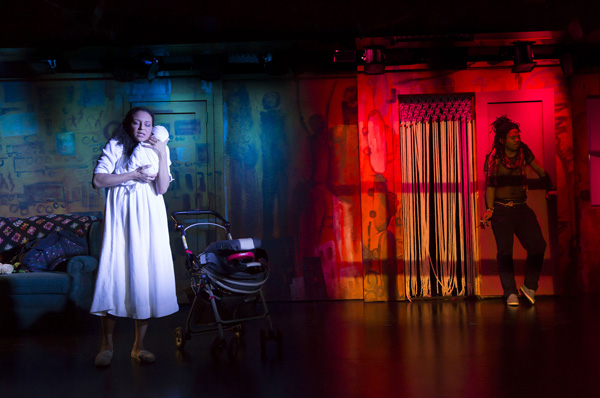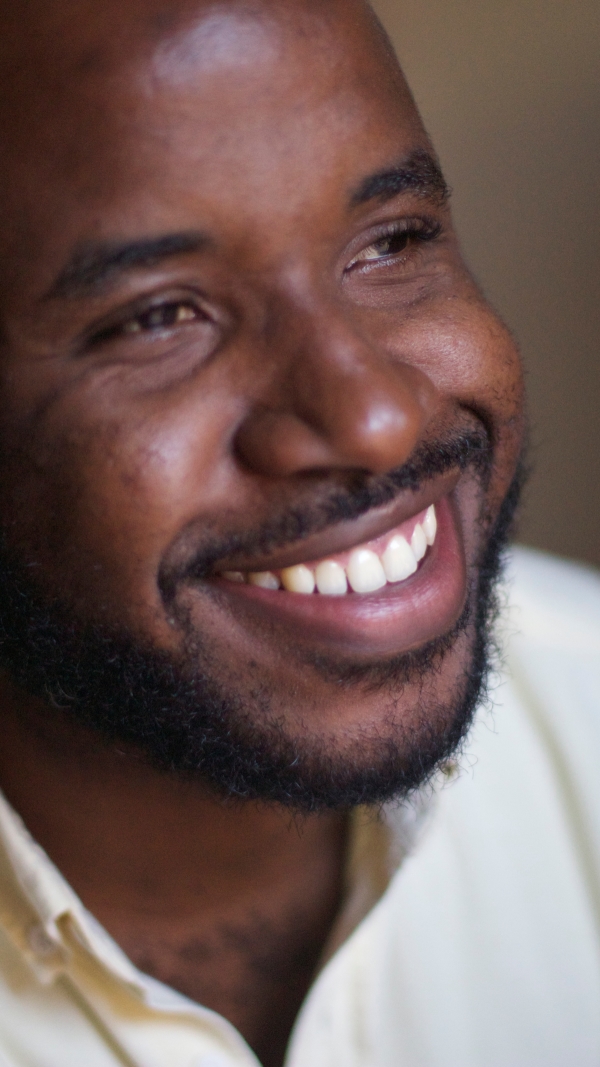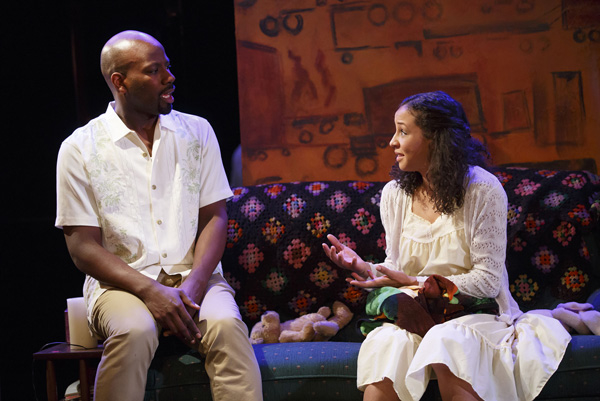Jeff Augustin Dreams of Haiti in Little Children Dream of God
The new play at Roundabout Underground explores generational conflict between immigrants and their American children, among many other issues.

(© Joan Marcus)
An expansive world springs from the cozy confines of the black box theater at the Harold and Miriam Steinberg Center for Theatre. Miami, Haiti, the Atlantic Ocean: You wouldn't expect them all to fit in the 62-seat theater buried deep below West 46th Sstreet, but they do in Jeff Augustin's Little Children Dream of God, now making its world premiere with Roundabout Underground.
It's the story of Sula, a refugee on the run from her native Haiti. She lands in a bustling Florida apartment complex full of immigrants where she meets Carolyn, a transplant from the Midwest who claims to have eight children fathered by God. But it's also about Joel, the building's Haitian-American landlord and his thoroughly assimilated cousin Madison. It's about a mean old Cuban-American man in hospice and a young gay sex worker. The play takes us in many directions because its author clearly has a sprawling imagination.
Augustin spoke to TheaterMania about his impetus for writing Little Children, including his own family's journey from Haiti to the United States.

Where did this play come from?
I was having a conversation with my mom about when she immigrated here. She traveled from Haiti to Miami while she was pregnant with my older brother. She was telling me what it is like to immigrate with children and not have any family to support you. I'm the youngest of seven. My sister and I were the only two born here. Everyone else was born in Haiti. I'm fascinated by why we leave our homes. What are we running from? My mom loves Haiti. In an ideal world, she probably would never have left. She talks about going back when she retires. But she wanted to give us a better start to life.
Did you grow up in a neighborhood similar to the building depicted in the play?
The play is set in Overtown, Miami. I grew up there. At one point I mention an address in the play that is actually the address where I grew up. In that building there was a sense of safety and community. A lot of us there were immigrants. We left our homes and communities and created this new one.
As a second-generation American, do you feel a tension between honoring your mother's Haitian culture and being an American?
Growing up there was this moment in middle school where it really clicked with me that I wasn't an African-American — I was a Haitian-American. I wanted to explore what that means. There's a part of me, even in my writing, that is always terrified that I'm not "getting it right," whatever that means. I do feel torn between being a part of a Haitian culture and part of this world. Some of my older siblings came here when they were sixteen or seventeen. They have a much stronger sense of Haitian identity and roots. There was always part of me struggling with that.

(© Joan Marcus)
The character of Madison, Joel's cousin who listens to traditional Haitian music in her suburban home while sipping red wine, also seems to be struggling with her Haitian roots. Have you noticed a tendency of second- and third-generation Americans to fetishize their ancestral culture?
I think there is that to a certain extent. Growing up, I've met Madisons. She's trying to connect to her roots, but doesn't quite know how. She has an Americanized way to go about it. I think that really comes from how their parents felt about their culture. There are people who immigrate here and try to assimilate very quickly to American culture. There are others who hold on to their roots while recognizing that they're American.
Why was it important for you to include a gay Caribbean character (Vishal) in this story?
I'm gay. There's a lack of gay Caribbean characters onstage. Of course, in a lot of Caribbean countries there is a lack of tolerance for gay men and women. There's a simplified idea of being a gay man: You're either effeminate or you're not. Vishal is both. He's the one who stands up to the strange man lurking around the building, but he can also be fun and flirty. That was important to me.
Did you find it hard explaining to your immigrant parents that you wanted to be a playwright?
Hahahaha. I actually started as an economics/poli-sci double major at Boston College. Then I took an intro to theater class with Scott Cummings, which I found amazing. It's the reason I'm a playwright today. I switched and became an English/theater major. My mom was an educator in Haiti and she was incredibly supportive. My father, however, still reminds me that it's not too late for law school. He's not quite sold yet, but I think he's slowly getting there.








